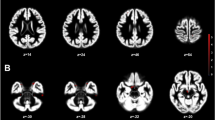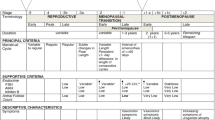Abstract
Purpose of Review
Previous literature has shown inconsistent findings regarding the effects of neurosteroids on the brain in postmenopausal women. The goal of this paper is to examine how and whether advances in neuroimaging have helped elucidate the relationship between the withdrawal of and/or treatment with neurosteroids and cognition at menopause.
Recent Findings
Neuroimaging techniques such as structural and functional MRI have been used in recent studies to examine the relationship between neurosteroids and brain structure and functioning. However, the recent literature shows that different formulations of postmenopausal hormones given at different times, through different routes of administration, and in different combinations with progestins result in a variety of relationships with the brain outcomes.
Summary
We suggest that still further research is needed to understand how the structural changes resulting from estrogen withdrawal or therapy at menopause can influence cognitive functioning. However, imaging studies are time-, resource-, and expertise-intensive. We believe that this information will help uncover the mechanisms and relationships that can aid in the explanation of the individual differences in the effects of menopause on the brain as well as how this menopause-related hormone change influences risk for pathological aging.
Similar content being viewed by others
References
Papers of particular interest, published recently, have been highlighted as: • Of importance •• Of major importance
Berent-Spillson A, Persad CC, Love T, Sowers M, Randolph JF, Zubieta JK, et al. Hormonal environment affects cognition independent of age during the menopause transition. J Clin Endocrinol Metab. 2012;97(9):E1686–94. https://doi.org/10.1210/jc.2012-1365.
Gleason C, Schmitz T, Hess T, Koscik R, Trivedi M, Ries M, et al. Hormone effects on fMRI and cognitive measures of encoding: importance of hormone preparation. Neurology. 2006;67(11):2039–41. https://doi.org/10.1212/01.wnl.0000247277.81400.43.
Gibbs RB. Estrogen and nerve growth factor-related systems in brain. Ann N Y Acad Sci. 1994;743(1):165–96. https://doi.org/10.1111/j.1749-6632.1994.tb55792.x.
Gibbs RB. Expression of estrogen receptor-like immunoreactivity by different subgroups of basal forebrain cholinergic neurons in gonadectomized male and female rats. Brain Res. 1996;720(1–2):61–8. https://doi.org/10.1016/0006-8993(96)00106-0.
Lee SJ, McEwen BS. Neurotrophic and neuroprotective actions of estrogens and their therapeutic implications. Annu Rev Pharmacol Toxicol. 2001;41:569–91. https://doi.org/10.1146/annurev.pharmtox.41.1.569.
Toran-Allerand CD, Miranda RC, Bentham WD, Sohrabji F, Brown TJ, Hochberg RB, et al. Estrogen receptors colocalize with low-affinity nerve growth factor receptors in cholinergic neurons of the basal forebrain. Proc Natl Acad Sci USA. 1992;89(10):4668–72.
Duka T, Tasker R, McGowan JF. The effects of 3-week estrogen hormone replacement on cognition in elderly healthy females. Psychopharmacology. 2000;149(2):129–39. https://doi.org/10.1007/s002139900324.
Duff SJ, Hampson E. A beneficial effect of estrogen on working memory in postmenopausal women taking hormone replacement therapy. Horm Behav. 2000;38(4):262–76. https://doi.org/10.1006/hbeh.2000.1625.
Binder EF, Schechtman KB, Birge SJ, Williams DB, Kohrt WM. Effects of hormone replacement therapy on cognitive performance in elderly women. Maturitas. 2001;38(2):137–46.
Almeida OP, Lautenschlager NT, Vasikaran S, Leedman P, Gelavis A, Flicker L. A 20-week randomized controlled trial of estradiol replacement therapy for women aged 70 years and older: effect on mood, cognition and quality of life. Neurobiol Aging. 2006;27(1):141–9. https://doi.org/10.1016/j.neurobiolaging.2004.12.012.
Halbreich U, Lumley LA, Palter S, Manning C, Gengo F, Joe SH. Possible acceleration of age effects on cognition following menopause. J Psychiatr Res. 1995;29(3):153–63.
McEwen BS. Invited review: Estrogens effects on the brain: multiple sites and molecular mechanisms. J Appl Physiol (Bethesda, Md : 1985). 2001;91(6):2785–801. https://doi.org/10.1152/jappl.2001.91.6.2785.
Fuh JL, Wang SJ, Lee SJ, Lu SR, Juang KD. A longitudinal study of cognition change during early menopausal transition in a rural community. Maturitas. 2006;53(4):447–53. https://doi.org/10.1016/j.maturitas.2005.07.009.
Meyer PM, Powell LH, Wilson RS, Everson-Rose SA, Kravitz HM, Luborsky JL, et al. A population-based longitudinal study of cognitive functioning in the menopausal transition. Neurology. 2003;61(6):801–6.
Greendale GA, Huang M, Wight RG, Seeman T, Luetters C, Avis NE et al. Effects of the menopause transition and hormone use on cognitive performance in midlife women. Neurology. vol 212009. p. 1850–7.
Luetters C, Huang MH, Seeman T, Buckwalter G, Meyer PM, Avis NE, et al. Menopause transition stage and endogenous estradiol and follicle-stimulating hormone levels are not related to cognitive performance: cross-sectional results from the study of women’s health across the nation (SWAN). J Women’s Health (Larchmt). 2007;16(3):331–44.
Maki PM. Hormone therapy and cognitive function: is there a critical period for benefit? Neuroscience. 2006;138:1027–30.
Sherwin BB. The critical period hypothesis: can it explain discrepancies in the oestrogen-cognition literature? J Neuroendocrinol. 2007;19(2):77–81.
Tang MX, Jacobs D, Stern Y, Marder K, Schofield P, Gurland B, et al. Effect of oestrogen during menopause on risk and age at onset of Alzheimer’s disease. Lancet (London, England). 1996;348(9025):429–32. https://doi.org/10.1016/s0140-6736(96)03356-9.
Kawas C, Resnick S, Morrison A, Brookmeyer R, Corrada M, Zonderman A, et al. A prospective study of estrogen replacement therapy and the risk of developing Alzheimer’s disease: the Baltimore Longitudinal Study of Aging. Neurology. 1997;48(6):1517–21.
Zandi PP, Carlson MC, Plassman BL, Welsh-Bohmer KA, Mayer LS, Steffens DC, et al. Hormone replacement therapy and incidence of Alzheimer disease in older women: the Cache County Study. JAMA. 2002;288(17):2123–9.
Shao H, Breitner JC, Whitmer RA, Wang J, Hayden K, Wengreen H, et al. Hormone therapy and Alzheimer disease dementia: new findings from the Cache County Study. Neurology. 2012;79(18):1846–52. https://doi.org/10.1212/WNL.0b013e318271f823.
Kugaya A, Epperson CN, Zoghbi S, van Dyck CH, Hou Y, Fujita M, et al. Increase in prefrontal cortex serotonin 2A receptors following estrogen treatment in postmenopausal women. Am J Psychiatry. 2003;160(8):1522–4. https://doi.org/10.1176/appi.ajp.160.8.1522.
Maki PM, Resnick SM. Longitudinal effects of estrogen replacement therapy on PET cerebral blood flow and cognition. Neurobiol Aging. 2000;21(2):373–83.
Joffe H, Hall JE, Gruber S, Sarmiento IA, Cohen LS, Yurgelun-Todd D, et al. Estrogen therapy selectively enhances prefrontal cognitive processes: a randomized, double-blind, placebo-controlled study with functional magnetic resonance imaging in perimenopausal and recently postmenopausal women. Menopause (New York, NY). 2006;13(3):411–22. https://doi.org/10.1097/01.gme.0000189618.48774.7b.
• Marjoribanks J, Farquhar C, Roberts H, Lethaby A, Lee J. Long-term hormone therapy for perimenopausal and postmenopausal women. Cochrane Database Syst Rev. 2017;1:Cd004143. https://doi.org/10.1002/14651858.CD004143.pub5. This article is a recent Cochrane review of hormone therapy and cogntion
Kuh D, Cooper R, Moore A, Richards M, Hardy R. Age at menopause and lifetime cognition: findings from a British birth cohort study. Neurology. 2018;90(19):e1673–e81. https://doi.org/10.1212/wnl.0000000000005486.
• Henderson VW, St John JA, Hodis HN, McCleary CA, Stanczyk FZ, Shoupe D, et al. Cognitive effects of estradiol after menopause: a randomized trial of the timing hypothesis. Neurology. 2016;87(7):699–708. https://doi.org/10.1212/wnl.0000000000002980. This study describes a test of the timing hypothesis for a beneficial effect of estradiol on cogntion after menopause
Ashburner J, Friston KJ. Voxel-based morphometry--the methods. NeuroImage. 2000;11(6 Pt 1):805–21. https://doi.org/10.1006/nimg.2000.0582.
Erickson KI, Colcombe SJ, Raz N, Korol DL, Scalf P, Webb A, et al. Selective sparing of brain tissue in postmenopausal women receiving hormone replacement therapy. Neurobiol Aging. 2005;26(8):1205–13. https://doi.org/10.1016/j.neurobiolaging.2004.11.009.
Boccardi M, Ghidoni R, Govoni S, Testa C, Benussi L, Bonetti M, et al. Effects of hormone therapy on brain morphology of healthy postmenopausal women: a voxel-based morphometry study. Menopause. 2006;13(4):584–91. https://doi.org/10.1097/01.gme.0000196811.88505.10.
•• Zhang T, Casanova R, Resnick SM, Manson JE, Baker LD, Padual CB, et al. Effects of hormone therapy on brain volumes changes of postmenopausal women revealed by optimally-discriminative voxel-based morphometry. PloS One. 2016;11(3):e0150834. https://doi.org/10.1371/journal.pone.0150834. This study uses an analysis technique to examine strutural brain differences that is sensitive to group differences to examine the effects of hormone therapy on brain structure
Zhang T, Davatzikos C. Optimally-Discriminative Voxel-Based Morphometry significantly increases the ability to detect group differences in schizophrenia, mild cognitive impairment, and Alzheimer’s disease. NeuroImage. 2013;79:94–110. https://doi.org/10.1016/j.neuroimage.2013.04.063.
•• Kim GW, Park K, Jeong GW. Effects of sex hormones and age on brain volume in post-menopausal women. J Sex Med. 2018;15(5):662–70. https://doi.org/10.1016/j.jsxm.2018.03.006. This study examined the relationship between gray matter change and estradiol level in postmenopausal women
•• Albert K, Hiscox J, Boyd B, Dumas J, Taylor W, Newhouse P. Estrogen enhances hippocampal gray-matter volume in young and older postmenopausal women: a prospective dose-response study. Neurobiol Aging. 2017;56:1–6. https://doi.org/10.1016/j.neurobiolaging.2017.03.033. This study examines the effect of estradiol dose on hippocampal volume in postmenopausal women
•• Braden BB, Dassel KB, Bimonte-Nelson HA, O’Rourke HP, Connor DJ, Moorhous S, et al. Sex and post-menopause hormone therapy effects on hippocampal volume and verbal memory. Neuropsychology, development, and cognition Section B, Aging, neuropsychology and cognition. 2017;24(3):227–46. https://doi.org/10.1080/13825585.2016.1182962. This study examined hippocampal volume in postmenopausal women and men
•• Kantarci K, Tosakulwong N, Lesnick TG, Zuk SM, Gunter JL, Gleason CE, et al. Effects of hormone therapy on brain structure: a randomized controlled trial. Neurology. 2016;87(9):887–96. https://doi.org/10.1212/wnl.0000000000002970. This study examined the influence of two different formuations of estrogen therapy on brain structure
•• Kantarci K, Tosakulwong N, Lesnick TG, Zuk SM, Lowe VJ, Fields JA, et al. Brain structure and cognition 3 years after the end of an early menopausal hormone therapy trial. Neurology. 2018;90(16):e1404–e12. https://doi.org/10.1212/wnl.0000000000005325. This study examined the effects of estrogen therapy on brain structure three years after the discontinuation of the medication
•• Berent-Spillson A, Briceno E, Pinsky A, Simmen A, Persad CC, Zubieta JK, et al. Distinct cognitive effects of estrogen and progesterone in menopausal women. Psychoneuroendocrinology. 2015;59:25–36. https://doi.org/10.1016/j.psyneuen.2015.04.020. This study was the first to examine the separate effects of estradiol and progesterone on cognition function after menopause
•• Berent-Spillson A, Kelley AS, Persad CC, Love T, Frey KA, Reame NE, et al. Postmenopausal hormone treatment alters neural pathways but does not improve verbal cognitive function. Menopause. 2018; https://doi.org/10.1097/gme.0000000000001157. This is an fMRI study of the effects of hormone therapy on brain funcitoning
•• Girard R, Metereau E, Thomas J, Pugeat M, Qu C, Dreher JC. Hormone therapy at early post-menopause increases cognitive control-related prefrontal activity. Sci Rep. 2017;7:44917. https://doi.org/10.1038/srep44917. This study examined the effects of hormone therapy on cognitive control related brain activation in women who were early post menopause
Funding
Baillie Frizell received support from NIH R25 NS090623. Julie Dumas received support from NIH R01 AG050716.
Author information
Authors and Affiliations
Corresponding author
Ethics declarations
Conflict of Interest
The authors declare that they have no conflict of interest.
Human and Animal Rights and Informed Consent
This article does not contain any studies with human or animal subjects performed by any of the authors.
Additional information
This article is part of the Topical Collection on Reproductive Psychiatry and Women’s Health
Rights and permissions
About this article
Cite this article
Frizell, B., Dumas, J.A. Examining the Relationship Between Neurosteroids, Cognition, and Menopause With Neuroimaging Methods. Curr Psychiatry Rep 20, 96 (2018). https://doi.org/10.1007/s11920-018-0963-2
Published:
DOI: https://doi.org/10.1007/s11920-018-0963-2




